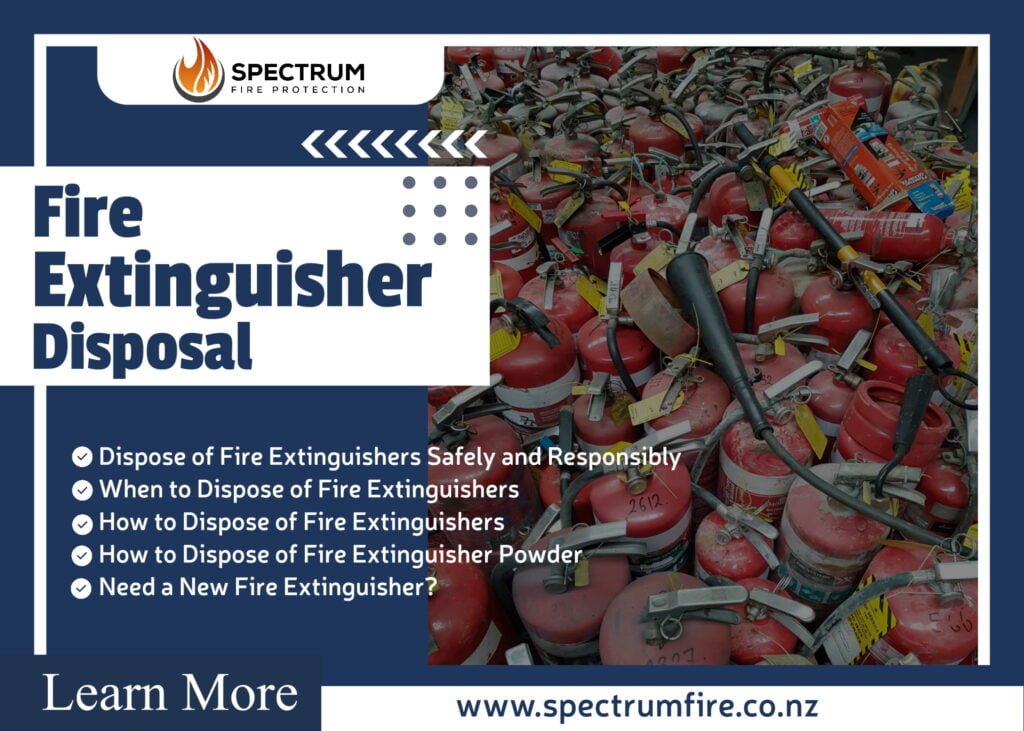Fire extinguishers are essential devices that can save lives and property in case of a fire. However, they are not meant to last forever and may need to be replaced or disposed of at some point. Improper disposal of fire extinguishers can pose environmental and safety hazards, so it is important to follow the right steps when disposing of them.
When to Dispose of Fire Extinguishers
There are several situations when you may need to dispose of your fire extinguisher, such as:
- It has been used. Even if you only used a small amount of the extinguishing agent, you should replace your fire extinguisher as soon as possible. The remaining pressure and contents may not be enough to put out another fire effectively. You can also contact a fire protection company to see if they can recharge or refill your fire extinguisher for reuse.
- It is damaged or expired. Fire extinguishers have a limited lifespan and should be inspected regularly for signs of wear and tear. If you notice any of the following problems, you should dispose of your fire extinguisher immediately:
- A cracked, clogged, or ripped hose or nozzle
- A missing or broken pin or tamper seal
- A broken or wobbly handle
- A missing or outdated inspection tag
- A dent, rust, or leak on the cylinder
- A low or empty-pressure gauge
- It is illegal or obsolete. Some fire extinguishers types are no longer allowed or recommended for use due to their harmful environmental effects. These include yellow or halon fire extinguishers that contain ozone-depleting substances. You should immediately dispose of these fire extinguishers and replace them with more eco-friendly alternatives.
How to Dispose of Fire Extinguishers
Depending on the type and condition of your fire extinguisher, there are different ways to dispose of it safely and responsibly:
- Recycle it. If your fire extinguisher is empty and made of steel, you can recycle it at a local recycling facility or transfer station. Do not put it in your regular recycling bin, as it is classified as hazardous waste. Before you recycle it, squeeze the handle to release any remaining pressure and pop off the head to prove that it is empty. Do not try to crush or flatten it, as it may still explode.
- Return it. If your fire extinguisher is full or contains halon, you can return it to your local supplier for proper disposal. They will take care of the fire extinguisher and send it to a specialised facility for processing. Do not attempt to empty or discharge the fire extinguisher yourself, as it may cause injury or damage.
- Dispose of it. If you cannot recycle or return your fire extinguisher, you can dispose of it at a hazardous waste disposal facility near you. They will accept your fire extinguisher and handle it according to the environmental regulations. You can find a suitable facility on EnviroWaste.
How to Dispose of Fire Extinguisher Powder
If you have used a dry powder fire extinguisher, you may have some leftover residue that needs to be cleaned up. The powder can be irritating to the eyes, skin, and lungs, so you should wear protective gloves, goggles, and a mask when handling it. To dispose of the powder, follow these steps:
- Vacuum the loose residue from the affected area.
- Clean the area with soap and water to remove any traces of powder.
- Dispose of the powder in a plastic bag in the bin.
Need a New Fire Extinguisher?
After you have disposed of your old fire extinguisher, you should replace it with a new one as soon as possible. Fire extinguishers are vital for fire safety and prevention in your home or business. You should choose a fire extinguisher that suits your needs and complies with the current New Zealand safety standards.
At Spectrum Fire, we can supply, install, refill, and inspect fire extinguishers for you. We are experts in fire and building compliance and offer professional advice and service. Contact us today for a free quote and ensure your property is protected from fire hazards.


